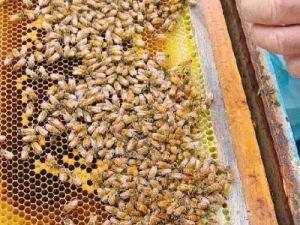Global retailers taste NZ mānuka honey offerings
Thousands of honey retailers and professionals worldwide are getting a taste of the remarkable properties of New Zealand mānuka honey.
 30 hectares of mānuka will be initially planted on Northland College land – an initiative that provides current and future employment opportunities for Kaikohe people.
30 hectares of mānuka will be initially planted on Northland College land – an initiative that provides current and future employment opportunities for Kaikohe people.
This week marked the first day of work for 11 Work and Income clients, who will be developing Northland College's mānuka plantation site.
30 hectares of mānuka will be initially planted on Northland College land – an initiative that provides current and future employment opportunities for Kaikohe people.
The Northland College Mānuka Initiative stems from the Tai Tokerau Northland Economic Action Plan which identifies 58 actions for stimulating the Northland economy.
Senior Regional Official, Ben Dalton is responsible for the government's delivery of the Action Plan and highlights the significance of the Northland College Manuka Initiative.
"The mānuka honey production industry as well as many other primary industries have been identified as a growing industry in Northland. That means there will be more jobs available, and skilled workers will be in demand," says Dalton.
"The 11 people have been trained in foundation forestry skills and will be working for 16 weeks. Solid training combined with solid experience on the job means these workers will be ready when new jobs open up. We want local primary industries to be able to employ skilled locals."
"The initiative not only provides work opportunities immediately, it also provides Northland College students the opportunity to study Apiculture through Lincoln University, and gain practical experience on site, giving them an upper hand for future employment," Dalton adds.
The Initiative is being implemented by Northland College and supported by Ministry for Primary Industries, Te Puni Kokiri and Ministry for Social Development.
Background information
With government support, an initial 30 hectares of Northland College land will be planted in high performing mānuka cultivars for honey production. By 2017, this is expected to extend to 100 hectares.
Knowing what mānuka cultivars to plant, and how the plantation is to be planted and managed for honey production are a result of successful scientific research to date that the Ministry for Primary Industries and Manuka Research Partnership (NZ) Ltd are investing in through the Primary Growth Partnership.
The mānuka site will provide revenue in the future for the College to reinvest.
The mānuka plantation site has the potential for high erosion and the mānuka will help stabilise the land to stop more erosion.
This initiative was a highlight of the Tai Tokerau Northland Economic Action Plan in February this year. 5 Ministers visited the school and planted mānuka trees on the school grounds to symbolise the significance of the project.
On the eve of his departure from Federated Farmers board, Richard McIntyre is thanking farmers for their support and words of encouragement during his stint as a farmer advocate.
A project reducing strains and sprains on farm has won the Innovation category in the New Zealand Workplace Health and Safety Awards 2025.
Beef + Lamb New Zealand (B+LNZ), in partnership with the Ministry for Primary Industries (MPI) and other sector organisations, has launched a national survey to understand better the impact of facial eczema (FE) on farmers.
One of New Zealand's latest and largest agrivoltaics farm Te Herenga o Te Rā is delivering clean renewable energy while preserving the land's agricultural value for sheep grazing under the modules.
Global food company Nestle’s chair Paul Bulcke will step down at its next annual meeting in April 2026.
Brendan Attrill of Caiseal Trust in Taranaki has been announced as the 2025 National Ambassador for Sustainable Farming and Growing and recipient of the Gordon Stephenson Trophy at the National Sustainability Showcase at in Wellington this evening.